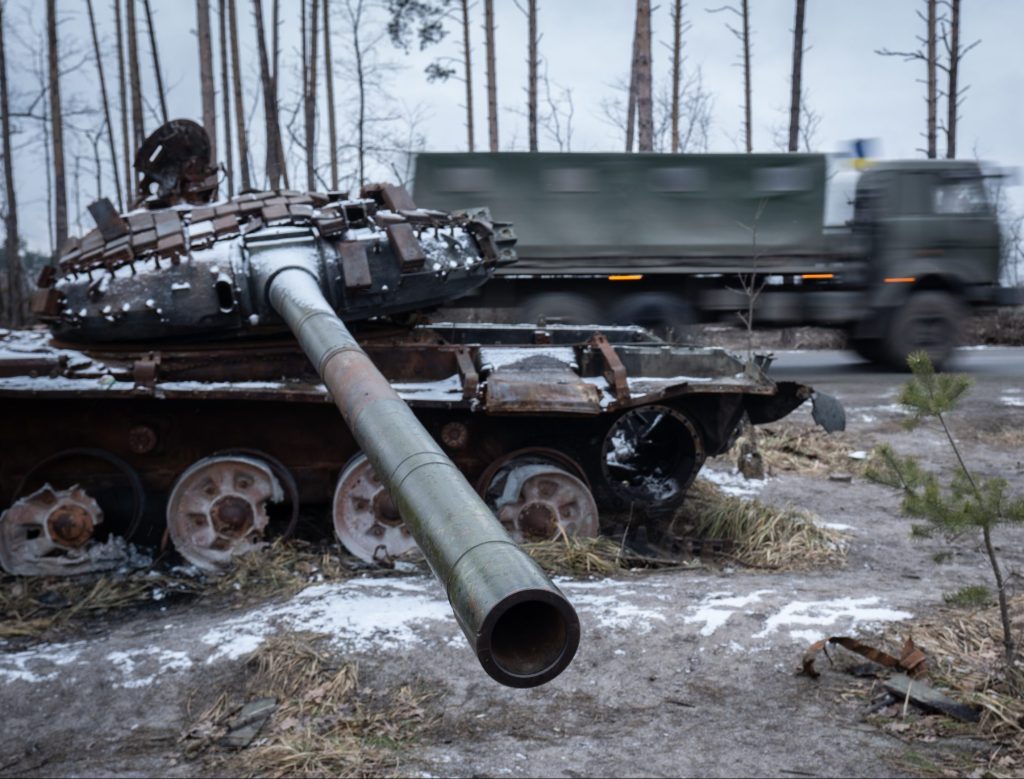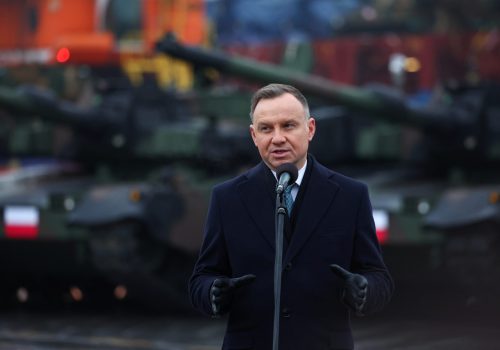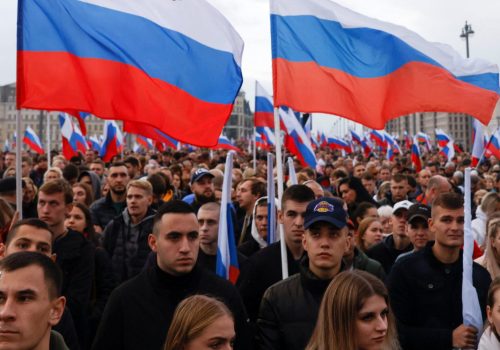On January 31, delegates gathered at the European Parliament in Brussels for a conference exploring the prospects for the “decolonization” of Russia. Organized by MEPs from the European Conservatives and Reformists (ECR) political group within the European Parliament, this event highlighted growing international recognition of modern Russia’s imperial identity and increasing awareness of the threats this poses to European security.
Participants included representatives of the indigenous peoples of the Russian Federation, many of whom have been working for some time within the framework of the Free Nations of Post-Russia Forum. They were joined by numerous Members of the European Parliament and a host of international experts.
An event on this scale would have been hard to imagine just one year ago. However, the invasion of Ukraine has thrust the topic of Russian imperialism firmly into the European mainstream. Over the past year, a steady stream of analytical articles and opinion pieces have appeared in respected international publications accusing Vladimir Putin of pursuing an imperial agenda in Ukraine and calling for the decolonization of Russia itself. While there is still no consensus on the desirability of a new Russian collapse, the topic is no longer taboo.
Stay updated
As the world watches the Russian invasion of Ukraine unfold, UkraineAlert delivers the best Atlantic Council expert insight and analysis on Ukraine twice a week directly to your inbox.
The last big Russian collapse caught the world by surprise and was far from universally welcomed. Indeed, some in the West saw the looming 1991 disintegration of the USSR as hugely destabilizing from an international security perspective and sought to prevent it. Most notoriously, US President George H. W. Bush traveled to Kyiv just weeks before the August 1991 Ukrainian Declaration of Independence to warn members of Soviet Ukraine’s parliament against “suicidal nationalism.”
Critics argue that the international community has been equally accommodating of Vladimir Putin’s efforts to rebuild Russia’s imperial influence since the turn of the millennium. The Second Chechen War, the 2008 invasion of Georgia, and the 2014 invasion of Ukraine all failed to fundamentally disrupt relations between Russia and the West. Indeed, in areas such as the energy sector, cooperation continued to deepen even after Moscow had illegally annexed Ukraine’s Crimean peninsula and sparked a war in the Donbas region of eastern Ukraine. These flourishing economic ties helped create the financial foundations for the full-scale invasion of Ukraine in February 2022.
As the Putin regime has attempted to reassert its imperial influence in Ukraine, Georgia, and other countries that were formerly part of the Czarist and Soviet empires, Moscow has also been actively restricting the rights of the dozens of different national and ethnic groups within the boundaries of the modern Russian state. Despite calling itself the Russian Federation, today’s Russia is a highly centralized and increasingly authoritarian country. National minorities throughout Russia must contend with the colonial exploitation of natural resources in their homelands while also playing a disproportionately prominent role in the Kremlin’s wars of aggression.
Over the past year, Putin’s imperial ambitions have run into serious trouble in Ukraine. The Russian dictator expected a short, victorious war that would extinguish Ukrainian independence and force the country permanently back into the Kremlin orbit. Instead, his invading army has suffered catastrophic losses in both men and armor amid a series of battlefield defeats that have seriously damaged Russia’s reputation as a military superpower.
Despite these setbacks, Russian officials and Kremlin propagandists continue to promote an unapologetically imperialistic agenda. Foreign Minister Sergei Lavrov recently hinted that Moldova may face the same fate as Ukraine, while menacing statements directed at the Baltic states, Kazakhstan, and other Central Asian nations are routine features of the Kremlin-controlled Russian media. Until this imperial aggression is addressed, it will remain the greatest single threat to European security.
Eurasia Center events

There are various different perspectives on the problem of Russian imperialism. Some commentators advocate a reformed Russia existing as a genuinely federal and broadly democratic state within its current borders. Others argue that today’s Russia is an unrepentant empire and will remain so until it is broken up into a series of smaller countries.
This second and more radical option alarms many Western policymakers and commentators, who fear that the break-up of the Russian Federation would have disastrous consequences for nuclear proliferation and regional security. Gloomy forecasts anticipate a Russian collapse leading to a chaotic aftermath marked by the rise of nuclear-armed regional warlords and uncontrolled migration involving tens of millions of people.
In many ways, these fears mirror similar concerns at the time of the Soviet collapse. However, while the fall of the USSR brought considerable human misery for huge numbers of former Soviet citizens, this was accompanied by only a relatively small number of localized armed conflicts. Meanwhile, those nations that escaped the Soviet sphere of influence and were welcomed into NATO and the EU have gone on to prosper. Indeed, it is no coincidence that post-Soviet Russian aggression has focused on Moldova, Georgia, and Ukraine, all countries that the West hesitated to embrace after 1991.
The post-Soviet experience offers important lessons for today’s policymakers as they look ahead to the increasingly realistic possibility of a post-Russia world. While the collapse of the Russian Federation is a daunting prospect, it does not necessarily have to end in disaster.
In order to avoid the worst-case scenarios that many are currently predicting, it is vital to manage the process by engaging with democratically-minded people in all regions of Russia along with the country’s national minorities. In order to avoid being caught out, Western leaders need to accurately gauge the mood within Russia and assess the appetite for greater regional autonomy or independence.
Many in the West remain reluctant to take any steps that could be seen as promoting the idea of a new Russian collapse. Indeed, some argue that talk of decolonizing the Russian Federation risks legitimizing popular Kremlin propaganda narratives of a Western plot to destroy Russia. At the same time, there is no escaping the fact that Putin’s decision to invade Ukraine has put Russian imperialism at the top of the international security agenda while fueling serious discussion over the viability of the Russian state. In today’s highly volatile geopolitical climate, it makes sense to prepare for every eventuality.
Russian imperialism has proven deeply resistant to previous democratization efforts. Nevertheless, we may yet live to see the emergence of a democratic Russia as a productive and respected member of the international community. Alternatively, the Russian Federation may go the same way as the Czarist and Soviet empires and fragment into a number of smaller states, which could then develop into successful democracies. The only thing that can be said with any degree of certainty is that unless today’s Russia abandons its imperial identity, Europe will face more wars.
Taras Byk is a manager at Wooden Horse Strategies, LLC, a governmental-relations and strategic communications firm based in Kyiv.
Further reading
The views expressed in UkraineAlert are solely those of the authors and do not necessarily reflect the views of the Atlantic Council, its staff, or its supporters.

The Eurasia Center’s mission is to enhance transatlantic cooperation in promoting stability, democratic values and prosperity in Eurasia, from Eastern Europe and Turkey in the West to the Caucasus, Russia and Central Asia in the East.
Follow us on social media
and support our work
Image: A destroyed Russian tank near Bucha, Ukraine. January 29, 2023. (Photo by Kish Kim / Sipa USA)




